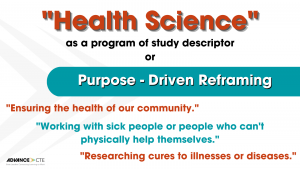Over the last two weeks, lawmakers in the House and Senate have continued to formally recognize the importance of Career Technical Education (CTE) and celebrated February as CTE Month® in a number of ways. Elsewhere, appropriations leaders continue to work on federal funding measures, Advance CTE endorsed several new pieces of legislation and federal agencies released new equity plans.
New Challenges Emerge in FY24 Funding Process
 The Senate remained in session last weekend to pass a highly anticipated supplemental national security aid package. Following that action, the Senate adjourned and is not expected to return to Capitol Hill until February 26. Meanwhile, the House met for an abbreviated work period this week where Republican lawmakers impeached Department of Homeland Security Alejandro Mayorkas. This action in the House will trigger a trial in the Senate when lawmakers return later this month. Due to Senate rules that require addressing this issue upon their return, this upcoming trial may impact ongoing negotiations, largely occurring behind the scenes, on federal fiscal year 2024 (FY24) spending, including the Labor-HHS-ED appropriations measure that funds the Carl D. Perkins Career and Technical Education Act (Perkins V) and other programs administered and overseen by the U.S. Departments of Education (ED) and Labor (DOL).
The Senate remained in session last weekend to pass a highly anticipated supplemental national security aid package. Following that action, the Senate adjourned and is not expected to return to Capitol Hill until February 26. Meanwhile, the House met for an abbreviated work period this week where Republican lawmakers impeached Department of Homeland Security Alejandro Mayorkas. This action in the House will trigger a trial in the Senate when lawmakers return later this month. Due to Senate rules that require addressing this issue upon their return, this upcoming trial may impact ongoing negotiations, largely occurring behind the scenes, on federal fiscal year 2024 (FY24) spending, including the Labor-HHS-ED appropriations measure that funds the Carl D. Perkins Career and Technical Education Act (Perkins V) and other programs administered and overseen by the U.S. Departments of Education (ED) and Labor (DOL).
At this time, it remains unclear how lawmakers will ultimately move forward with FY24 appropriations legislation beyond the upcoming expiration dates of current funding rapidly approaching on March 1 and March 8. Reportedly, appropriations leaders are currently negotiating potential “policy riders” that some lawmakers are seeking to attach to these funding measures, including Labor-HHS-ED. House lawmakers are currently scheduled to return after a recess period on February 28, leaving only a few days to determine a pathway forward. As these efforts continue to take shape, Advance CTE is continuing to advocate for robust funding for Perkins V’s formula grant program.
CTE Month Continues With Co-Chair Appearances and a New Senate Resolution
Yesterday, House CTE Caucus co-chairs Reps. Glenn “GT” Thompson (R-PA) and Suzanne Bonamici (D-OR) made an appearance on C-SPAN’s Washington Journal program to talk about the importance of CTE and the role it plays in the wider economy. The two leaders fielded questions from viewers and spoke at length about their experiences with CTE, the importance of the federal investment made by Perkins V and highlighted the immense value CTE programs provide to learners, especially by providing multiple pathways to postsecondary education, training and careers. These lawmakers also introduced the Counseling for Career Choice Act, bipartisan legislation that would strengthen career counseling services available to K-12 students. Advance CTE was proud to endorse this legislation upon introduction. In addition, House Education and Workforce Committee Chair Virginia Foxx (R-NC) provided floor remarks celebrating CTE month and emphasizing the important role CTE programs have in providing learners with valuable and durable skills.
On the other side of the Capitol, Senate CTE Caucus co-chair Senators Tim Kaine (D-VA), Todd Young (R-IN), Tammy Baldwin (D-WI) and Ted Budd (R-NC) introduced and passed a bipartisan resolution recognizing February as CTE month within the chamber. “This month and every month, let’s work to expand access to CTE, including by passing my JOBS Act to allow students to use Pell Grants for job training programs, and build an economy that works for everyone,” Senator Kaine remarked upon its passage.
Advance CTE applauds all of these lawmakers for their ongoing leadership on this issue and extends our community’s deep appreciation for continuing to elevate and highlight the significant importance of CTE this month and throughout the year.
Bipartisan Childcare CTE Bill Introduced
Earlier this week, Representatives Annie Kuster (D-NH), Lori Chavez-DeRemer (R-OR), Mike Lawler (R-NY) and Bonamici introduced the Early Childhood Workforce Advance Act. The legislation would provide new resources for CTE programs and aims to address significant workforce shortages in this critical sector of the economy. “The Early Childhood Workforce Advancement Act intentionally leverages CTE programs and ensures that these efforts are connected to ongoing state and local efforts to strengthen early educator workforce pipelines,” Advance CTE’s Executive Director Kate Kreamer shared upon the bill’s introduction. More information on the proposal can be found here.
ED Publishes Updated Equity Action Plan
At the beginning of the week, ED formally released its 2023 update to the Department’s existing “Equity Action Plan,” outlining new commitments to advance equity in education. ED identified five key focus areas:  improving college access and completion rates for underserved students; ensuring equitable resources for learning recovery; expanding educational opportunities for justice-impacted individuals to improve outcomes; advancing equity in career and technical education; and increasing mental health resources in underserved communities. In the plan, ED notes that it hopes to improve data transparency with regards to Perkins V data, host a future webinar series on equity in CTE and propose broadened equity indicators as part of its priorities for potential legislative updates to Perkins V in the years ahead. Read the full plan here.
improving college access and completion rates for underserved students; ensuring equitable resources for learning recovery; expanding educational opportunities for justice-impacted individuals to improve outcomes; advancing equity in career and technical education; and increasing mental health resources in underserved communities. In the plan, ED notes that it hopes to improve data transparency with regards to Perkins V data, host a future webinar series on equity in CTE and propose broadened equity indicators as part of its priorities for potential legislative updates to Perkins V in the years ahead. Read the full plan here.
Steve Voytek, Policy Advisor




